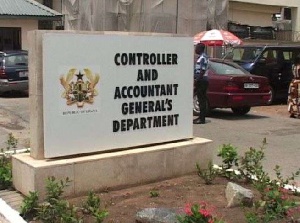The Controller and Accountants General Department (CAGD) has signed and handed over the 2022 National Accounts to the Auditor–General for review and validation, for its report preparation.
The document included the whole of government accounts, financial statements on the contingency fund and the Sinking Fund.
It covered over 800 expending units of Ministries Department and Agencies (MDA) of Central government, 261 Metropolitan Municipal and District Assemblies (MMDA) and 62 State-Owned Enterprises.
The gesture was in accordance with Public Fund Management (PFM) Act 921 2016 which mandates the Controller and Accountant-General to within three months after the end of each fiscal year, prepare and submit consolidated accounts to the Minister and the Auditor-General.
These included the consolidated annual accounts of the Government that include the accounts of the Contingency Fund, Sinking Fund, and the accounts of Petroleum Funds.
The Controller and Accountant-General are required under the Act to also indicate a defect, shortcoming, or any other factor which in the opinion of the Controller and Accountant General materially affects the responsibility of the Minister under the Act.
Speaking at a signing and presentation ceremony, Mr. Kwasi Kwaning-Bosompem said the institution which hitherto was 10 years in arrears of accounts submission had moved to real-time preparation of accounts due to the dedication of the hardworking staff.
He indicated that the scope for account preparation had also been broadened from the dependence on Consolidated Funds, which provided fewer data, including
contingency, Internally Generated Fund (IGF), Statutory fund, donor fund and any other fund established by the Act of Parliament.
The department, he said was seeking to advance the process of reporting through digitisation, adding that, “there would be a time where a report you see before me will just be two papers.”
The occasion was also used to commission a refurbished National Accounts Directorate to provide a conducive work environment for staff working under that outfit.
For the first time, he said the department had been able to include and capture 15 per cent of Legacy fixed assets of government to the accounts, which it intended to extend to 75 per cent by the close of the year.
“We have also applied fixed asset policy giving us depreciation charge on the income and expenditure,” he said.
Mr Johnson Akuamoah Asiedu, Auditor-General commended the CAGD for its consistency in timely submission of reports over the past three years, and “I think this a commendable achievement.”
He urged government entities to accord auditors all the needed assistance and respond to findings when opportunities are presented adding that, “they think that if they don’t respond we can’t issue our report.”
He said his outfit was looking to innovatively separate financial misappropriations from administrative irregularities in the audit reports to create less room for misinterpretation by the public.
“In our audit, we are mindful of the provision of the law that says in reporting to parliament we should draw the attention of parliament to any irregularities and for us.
“And for us irregularity is a broader term encompassing lack of supervision, internal control breakdown, flouting of procurement rules in addition to actual financial misapplication or misappropriation,” he said.
Business News of Friday, 31 March 2023
Source: GNA

















